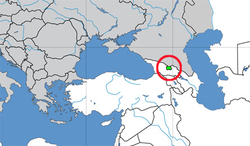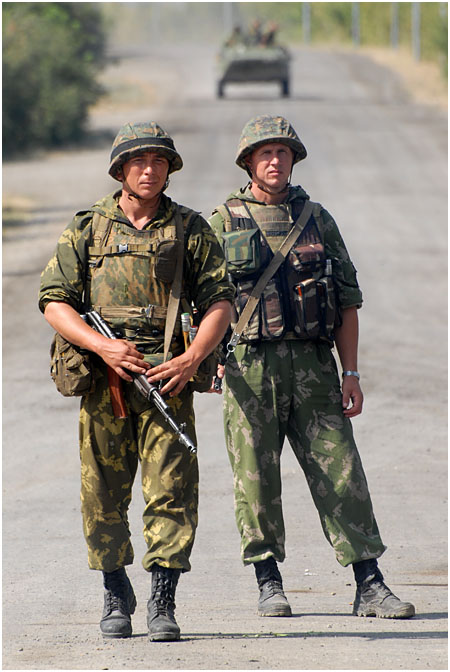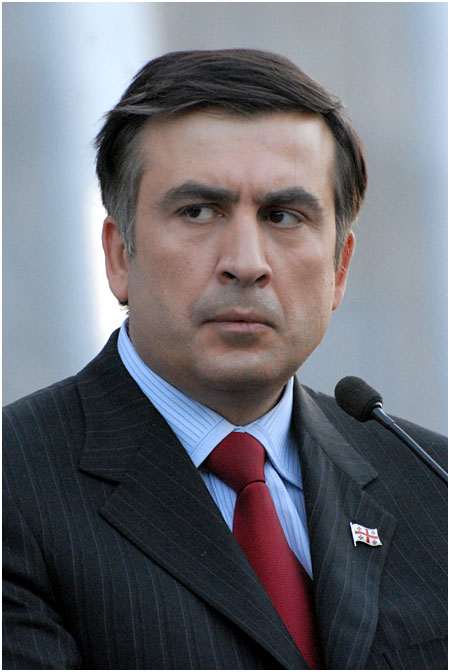This post is part of our special coverage Caucasus Conflict Voices [1].

As Georgia marked the second anniversary of its August 2008 war with Russia [2] over the breakaway territory of South Ossetia, online reaction has been mixed and largely polarized on geopolitical grounds. Evolutsia, for example, looks at the conflict from a largely pro-Georgian perspective [3].
[…] Most experts now agree, even if they disagree on the final orientation of the region, that the war was hardly a product of 2008 alone, but had roots that went back much further. Indeed, Russia’s involvement in the Caucasus has been several centuries in the making, and the more enterprising scholar might realistically trace the roots of the August 2008 war to Czarist Russian expansion in the 18th and 19th centuries. […]
[…]
On one hand, you have the words of US Senator John McCain, who recently declared in a Washington Post Op-ed that much has changed since 2008, but none “for the better.”
[…]
On the other hand, Georgian political scientist Ghia Nodia, in a column for the Radio Free Europe/Radio Liberty website, downplays the significance of the war and its long-term geopolitical effects. […] “The war did not produce chaos in Georgia or provoke a serious political or economic crisis.”
So who’s got it right?
[…]
[…] At worst, Georgia lost a few territories – most of which it didn’t actually have before the war anyway – and took a blow to its pride, not to mention the human and material cost of the war. At best, the war exposed Russia’s bald intentions in the region and failed to turn Georgia into a Kremlin vassal or failed state.

Russian checkpoint, Gori, Georgia © Onnik Krikorian 2008
Meanwhile, in New York, about 50 Georgians demonstrated outside the United Nations [4] against what they considered to be Russian aggression against one of its former satellites, Voices from Russia reports that a candlelight mass and vigil was held in Moscow [5].
Everyone remembers the chronology of these events in South Ossetia by heart. In the evening of 7 August, on Georgian television, Mikhail Saakashvili promised that he would not go to war, and that South Ossetia could sleep peacefully. People went home, and, literally, within an hour, Tskhinvali was engulfed by fire from Grad rocket launchers. People remember how the town burned, as children hid in basements, as tanks shot at civilians at point-blank range. These days will remain forever in their memories. […]
Although perhaps both opinions arguably paint the full picture, with many people believing that Russia had provoked Georgia, but with a European Union report clearly singling out Georgian President Mikhail Saakashvili to blame for the first shots fired in August 2008, Three Kings says that the war continues to be manipulated inside Georgia for internal domestic consumption.
Indeed, the blog says, Saakashvili has started to turn military defeat into personal political victory with fireworks lighting up the night sky in Tbilisi, the Georgian capital, to mark the anniversary [6].
Georgian President Mikheil Saakashvili pulled out all the stops to commemorate the biggest blunder of his presidency. […]
[…]
It is sad to me how Georgia continues to deceive itself in such absurd ways […] and the biggest share of the blame for that falls on Georgia’s bull-headed policies towards these breakaway republics since the fall of the Soviet Union.
Has Russia been a helpful influence here? Most certainly not. Did they want to topple the Saakashvili regime in 2008? Most certainly so. Were they halted from doing so by the Georgian military? Not even close. Within a couple of days of fighting, […] Putin correctly perceived that he could get away with destabilizing one of the West’s favorite little strategically located countries, but there would be serious consequences for a full occupation and regime change.
[…]
The opposition has been painted as pro-Russian and Saakashvili himself can hardly utter two words publicly without dramatically illustrating all the Russian guns pointed at Georgia’s head. […]
Looking back at the last two years it is clear there was a Georgian winner in the August war. But it wasn’t the Georgian people at large, or the future of the nation. Mikheil Saakashvili won, Georgia lost.

Mikhail Saakashvili Press Conference, Presidential Palace, Tbilisi, Georgia © Onnik Krikorian 2008
This post is part of our special coverage Caucasus Conflict Voices [1].